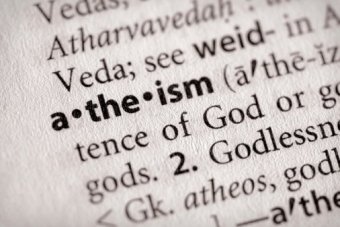God and the problem of sincere disbelief
Updated
It's a cliche, really. The beginning of the end for my Christian faith was getting an unbelieving girlfriend in my late teens. But it's not exactly as you might think.
She wasn't a radical atheist. She didn't try to steer me away from my faith. She had a sense of spirituality of her own, and was open to the idea of there being a god. In short, she had nothing against my Christianity: she just wasn't convinced by it.
That's what changed everything for me. It put me down a path of questioning from which I never returned.
It sounds strange, but the idea that there were people who had heard the Gospel and been left untouched by it was unfathomable to an evangelical kid like me. I always thought there must be other factors at play when it comes to disbelief.
But my girlfriend showed me that there were unbelievers who hadn't turned their backs on God in an act of grand Freudian defiance, or shunned their creator in spite of what they know in their hearts and minds to be true. That there were people who had looked at Christianity and been unmoved, unstirred; simply, unsold.
It was upon this realisation that the edifice of my faith began to crack.
Ultimately, it isn't a commitment to loving your neighbour or turning the other cheek that makes you a Christian. If it was, I'd still be one.
Rather, being a Christian means having particular views about history and science. Especially, it means having a specific belief about what went down in Jerusalem circa 30AD:
"For God so loved the world that he gave his one and only Son, that whoever believes in him shall not perish but have eternal life." (NIV translation)
Unfortunately, the Good News of John 3:16 isn't good news for anyone who doesn't share the belief that God's son was sent to Earth to die for our sins.
At best, you're missing out on eternal life. At worst, you're going to hell.
It always seemed unconscionable to me that someone could be denied salvation not because of a moral failing, but because they simply disagreed about the evidence for God.
Could God really deny salvation to someone just because they're unconvinced by the historical basis for the resurrection? Could someone really be condemned to hell for not being able to reconcile the idea of a loving God with a world of pain? What about people who sincerely see no need for the role of God in creation?
For a lot of Christians, these questions don't hold: disbelief is a moral failing. It makes sense that they'd think this way, given that the Bible has Jesus specifically referring to loving God as "the first and greatest commandment".
For them, no one who truly heard the story of Jesus Christ with an open heart could possibly respond in any other way than to recognise its truth.
What Christianity says about disbelief
I grew up hearing this sort of thing at church: "People reject Christ because they love their sin and they hate having it exposed by God's light."
That's more or less the gist of the less famous verses which follow John 3:16:
"Whoever believes in him is not condemned, but whoever does not believe stands condemned already because they have not believed in the name of God's one and only Son.
"This is the verdict: Light has come into the world, but people loved darkness instead of light because their deeds were evil. Everyone who does evil hates the light, and will not come into the light for fear that their deeds will be exposed."
The Psalms don't beat around the bush in their assessment of atheists, either:
The fool says in his heart, "There is no God." They are corrupt, their deeds are vile; there is no one who does good.
It would seem this attitude is still widespread. In 2014, the Pew Research Centre released the results of a survey which showed that many people around the world continue to see belief in God as essential to being moral.
For many Christians, people don't come to be agnostic or atheist after genuine searches for the truth. Instead, lack of faith comes from deliberate ignorance and wilful denial.
So if someone looks at Christianity and decides against it, they were never really open to faith in the first place.
William Lane Craig, one of evangelical Christianity's leading contemporary thinkers, says God makes his presence known to "those who listen":
"If you're sincerely seeking God, God will make his existence evident to you."
He's on strong biblical footing. St Paul told the Romans not merely that God reveals his existence to those who seek him, but that God's existence is undeniable:
"The wrath of God is being revealed from heaven against all the godlessness and wickedness of people, who suppress the truth by their wickedness, since what may be known about God is plain to them, because God has made it plain to them.
"For since the creation of the world God's invisible qualities — his eternal power and divine nature — have been clearly seen, being understood from what has been made, so that people are without excuse."
I came to realise this is just a giant ad hominem attack
Is belief in God essential to morality?
Yes response (percentage)- United States: 53
- Greece: 49
- Russia: 38
- Germany: 33
- Canada: 31
- Britain: 20
- Australia: 23
Highest yes response:
- Indonesia: 99
- Ghana: 99
- Pakistan: 98
- Egypt: 95
Lowest yes response:
- China: 14
- France: 15
- Spain: 19
- Czech Republic: 19
Source: Pew Research Centre
It was only when I got to university that I really questioned this.
More and more, I came to realise that the unbelievers I'd come across hadn't rejected faith because they wanted to remain ignorant or they felt Christianity threatened their immoral lifestyles. Instead, they'd looked at the evidence and concluded it didn't add up.
What's more, their pursuit for the truth wasn't just intellectual. They wanted to live their best lives and make the world a better place. Many would describe their journeys as spiritual.
Just as I've always seen most Christians as holding their beliefs sincerely and genuinely, I came to see the same was true of the atheists and agnostics around me.
During university, when I was still a Christian, I was once asked by my cousin, "You wouldn't marry someone who wasn't a Christian, would you?"
She later apologised, but I was pretty shocked. I remember thinking, Why wouldn't I?
I didn't want to lose my faith. It hurt, a lot
The opening line of novelist Julian Barnes' book Nothing To Be Frightened Of has stuck with me since I first read it almost a decade ago:
I don't believe in God, but I miss him.
I've since come to terms with the fact that I'm an atheist, and I no longer believe I'm missing out on anything. But it's still hard being the only non-Christian (that I know of, at least) in my entire extended family.
My coming out experience as an atheist was similar in many ways to that of singer David Bazan, whose 2009 album Curse Your Branches describes his break-up with God:
And no congratulations from my faithful family. Some of whom are already fasting to intercede for me.
My family has never been anything less than loving towards me, but there have been plenty of times when I've wished I could go to church with them and not feel like an imposter. When I've wished I could say "amen" during grace at a family dinner and actually mean it. When I've wished I could answer my parents' prayers that their prodigal son would return. And most of all, when I've wished I still had the comfort of knowing God is looking out for me.
I've told you what made me question my faith. It would take too long to explain what made me finally lose it.
Suffice to say, though, I didn't read Voltaire and Bertrand Russell and have the mud removed from my eyes in a moment of transcendent rational thinking. I certainly never came to the conclusion that those who believe in God are delusional. (In terms of strangeness, I think the idea that God created the world is pretty much on par with my belief that the universe somehow came into existence unbidden).
Ultimately, I just stopped seeing the case for Christ as convincing, historically and scientifically. That's it. It happened over an agonising few years and it was only after I'd finished university that I realised my faith was gone.
I might be wrong about God. But what I'm sure of is that my search for the truth has been genuine and my beliefs are sincere.
I can't prove that, of course. All I know is my own heart and (I think) the hearts of the nonbelievers around me. So in the end, rather ironically, I can only ask that this be taken on faith.
Topics: christianity, atheism
First posted









